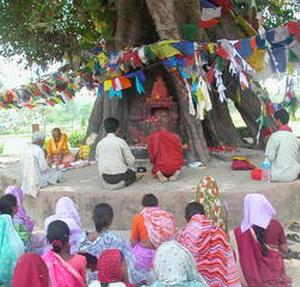p style=”text-align: center; margin-top: 0px; margin-bottom: 0px;” align=”center”>

|
Wednesday, November 26th 2013
|
The battle over Buddha is heating up. Recent excavations near Lumbini, Nepal may have unearthed the final resting place of the “Enlightened One.” If so, this discovery pushes back the date of his birth about 100 years to the sixth century B. C. Such timing is crucial to countries like Thailand that use a dating system keyed to the year of Buddha’s death. The problem is that no one is certain when he actually lived or when he really died. For hundreds of years Buddha scholars have debated his historical birth and death. Historians speculate that he died between 420-380 B.C. But current query is now focused on bits of charcoal from a wooden shrine built during an earlier projected date of birth.
This confusion is unlike the birth and death of Christ which even secular scholars admit is no more than a few years off at most. While the historical life of Buddha is shrouded with confusion, not so with Christ. There is no debate about the existence of the historical Jesus or contradictions about the approximation of when he was born and died. More important, is the contrast of teachings. The basic tenants of Buddhism centers on Gautama’s interpretation of human suffering. The essence of Buddhism is found in three premises: 1) Existence is suffering; 2) Desires causes suffering; 3) Ridding desire ends suffering. Desire can then be eradicated by following Buddha’s Eightfold Path and Four Noble Truths. The fallacy of such philosophical speculation is that it ignores the problem of sin and Satan. Omitting man’s fall and the devil’s doings from any analysis of human affairs leaves faulty presuppositions. More critical is the fact that no one is looking for the grave of Jesus as with Buddhists who have constantly sought the final resting place of Buddha. Jesus has no grave. There is no body. He has risen and that is the essential difference between Christianity and Buddhism. The introspective egocentricity of Buddhism can be contrasted to the commission of Christ to feed the hungry, clothe the poor, and heal the brokenhearted. In short, Buddha was a seeker and Jesus is a Savior. Enough said.
An encouraging word: YOU ARE NOT ALONE








